In the past few weeks, rap fans have celebrated legendary mixtapes from Lil Wayne and Rick Ross being uploaded to streaming platforms, but their time on these services may be cut short. A source close to Wayne told Rolling Stone that his Dedication and Da Drought mixtapes, recently removed from Tidal and Apple Music, were “not legal [or] legitimate uploads,” even though they were on his official artist pages. (Reps for Tidal and Apple Music did not respond to requests for comment.)
These uploads reflect potential flaws in the process of adding music to Digital Service Providers (DSPs). Streaming services like Apple Music, Tidal, and Spotify require artists to utilize third-party music distributors such as Distrokid, TuneCore, and RouteNote to upload music to their platforms. However, the scale of music regularly uploaded to self-service distributors means anyone can upload a song or album without official rights, attribute it to any artist they choose, and sometimes have these uploads slip through regulation onto artists’ official pages.
Coach Bombay 3000, a Brooklyn music manager for rapper Rome Streetz and several other acts, believes that it’s “pretty easy” for anyone to upload music to digital music distributors and have it appear on an artist’s official page. “There’s been times where there’s so much shit that says Rome Streetz [and] we never uploaded [it],” he says. “We’re like, ‘Who the fuck is this?’ We got to issue strikes to get it taken down.” Bombay says he’s dealt with people trying to upload music to Rome’s streaming pages “three times” in the last month.
He explains that when people use one of the digital music distributors, they can type Rome Streetz or Lil Wayne in the “primary artist” category of the upload form, add a link to the URL of the official artist page on the streaming service, and have a chance of the music bypassing quality control functions. He says that once the music is uploaded to streaming providers, his team has to ask the official distributor (an independent distributor or record label) to issue a takedown notice, which can take days. In the case of Wayne, it took almost a week for his mixtapes to be removed from Apple Music and Tidal.
Another anonymous source, who works in the streaming world, confirmed the ease of illegitimate uploads, adding “it happens that way all the time,” and they’ve seen a “crazy influx of fraud” in recent months. Sometimes users upload unlicensed music onto artists’ official pages, while other times they use accounts featuring the artist’s misspelled name or a nickname as the “primary artist.” The source also notes that artists sometimes take it upon themselves to add their legitimate collaborators as a “primary artist” without permission. “Some artists don’t like being added as a primary artist without their permission because whatever they’re tagged on as a primary artist shows up as their latest release.”
The source says that they’ll occasionally see these pending uploads fast enough to contact the music distributor or streaming platform, but sometimes they’re “not quick enough,” resulting in them going live on the platform. “It would likely come down to a shitty distributor or one with too much volume,” they said, likening the process to whack-a-mole. Bombay bemoans the “free-for-all” atmosphere on streaming platforms. “There’s no filter system,” he says. “There’s no process to make sure that everything that’s being uploaded is quality.”
While the mixtape scene allowed artists and DJs to release songs to blogs and sites like Datpiff and LiveMixtapes without regulation, streaming services are more stringent with unlicensed music, especially from popular acts. Wayne’s Dedication and Da Drought mixtapes feature him freestyling over beats from other artists who would have to clear them being used — ditto for his collaborators, who would have to approve their appearances for the projects to avoid copyright strikes.
In recent years, artists have re-released their early career mixtapes on streaming services. In 2020, Lil Wayne dropped a truncated version of 2011’s No Ceilings, Drake celebrated the 10th anniversary of So Far Gone with a 2019 release on streaming platforms. Nicki Minaj reissued her seminal 2009 mixtape Beam Me Up Scotty in 2021, and Travis Scott commemorated the 10th anniversary of Days Before Rodeo with an official release on streaming last year, while J. Cole went on to re-release a trio of his early mixtapes two months later. In each case, the artists announced the impending releases; the mysterious recent appearance of Wayne’s mixtapes, as well as Rick Ross’ 2011 Rich Forever project, made some fans skeptical.
When Ross was asked in May about clearing Rich Forever for streaming services, he said, “I really don’t wanna do it. That was at a certain point, I just wanted to do that for the streets.” There’s an entire wing of canonical mixtape music that’s available on YouTube, as well as platforms like LiveMixtapes and Datpiff, but isn’t officially on streaming platforms.
In 2021, the late Prodigy’s friend and engineer Joe “The Engine Ear” told Complex about the tedious process of getting the rap legend’s music cleared for DSPs. Joe noted that after Prodigy’s 2017 death, his estate removed his music from streaming to ensure that samples were cleared, publishing splits were correct, and all credits were properly attributed. “It’s hard to explain the amount of work that it took to get The Book of Heroine near the finish line,” he said.
While fans may sometimes circumvent overloaded or shoddy digital distributors to release unlicensed music, they usually won’t last long before being flagged. Still, Bombay notes, “the digital streaming platforms have no control over what goes out and what comes up.” The anonymous source expressed a slightly different sentiment, saying, “I think folks are trying to eliminate this issue. The problem is with rapid fans and hypebeasts, I feel they’ll always find a way.”



